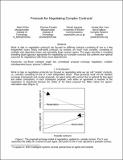Protocols for negotiating complex contracts
Author(s)
Sayama, H.; Bar-Yam, Y.; Klein, Mark; Faratin, Peyman
Downloadintellsys-03.pdf (57.40Kb)
PUBLISHER_POLICY
Publisher Policy
Article is made available in accordance with the publisher's policy and may be subject to US copyright law. Please refer to the publisher's site for terms of use.
Terms of use
Metadata
Show full item recordAbstract
Research to date on negotiation protocols has focused almost exclusively on defining simple contracts consisting of one or a few independent issues and a relatively small number of possible contracts. Many real-world contracts, in contrast, are much more complex, consisting of multiple interdependent issues and intractably large contract spaces. The family of negotiation protocols we've developed make substantial progress toward achieving near-optimal outcomes for negotiations with binary issue dependencies. We propose a simulated annealing-based approach, a refined version based on a parity-maintaining annealing mediator, and an unmediated version of the negotiation protocol. Keywords: protocols; contracts; proposals; simulated annealing; hamming distance; pareto optimization; aggregates; utility theory, software agents, contracts, simulated annealing; utility function; negotiation protocols; contract; binary issue dependency; simulated annealing-based approach; parity-maintaining annealing mediator; software agent
Date issued
2003Department
Massachusetts Institute of Technology. Computer Science and Artificial Intelligence Laboratory; Sloan School of Management; Massachusetts Institute of Technology. Center for Collective IntelligenceJournal
IEEE Intelligent Systems
Publisher
Institute of Electrical and Electronics Engineers (IEEE
Citation
Klein, M. et al. “Protocols for Negotiating Complex Contracts.” IEEE Intelligent Systems 18, 6 (November 2003): 32–38 © 2003 IEEE
Version: Original manuscript
ISSN
1541-1672